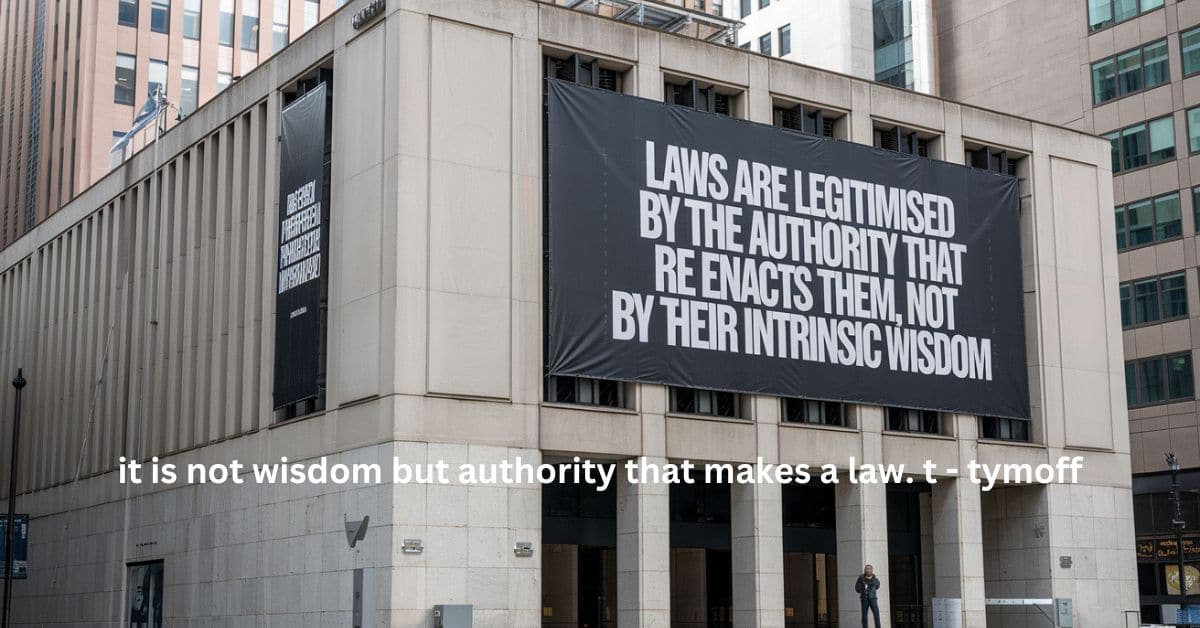The phrase, “It is not wisdom but authority that makes a law – T. Tymoff,” encapsulates a profound truth about the nature of legal systems. While wisdom might underpin the ideals of justice, authority ensures laws are enacted, enforced, and obeyed.
“It is not wisdom but authority that makes a law – T. Tymoff” emphasises that laws derive their enforceability from recognised authority rather than wisdom or moral judgment.
What Does the Quote Mean? – Learn The Concept!
The statement points to a sobering reality: laws are legitimised by the authority that enacts them, not by their intrinsic wisdom. Regardless of its ethical or rational foundations, a law becomes enforceable only when backed by a recognised authority.
Breaking It Down:
- Authority Defines Legitimacy
Laws must be supported by institutions or figures of authority to be considered legitimate, irrespective of their alignment with moral wisdom. - Wisdom’s Role Is Secondary
While wisdom can guide the creation of just laws, it does not guarantee enforceability. A wise law without authority is merely a suggestion. - The Practical Necessity of Authority
Authority ensures societal order by compelling adherence to laws, even those that may be unwise or unpopular.
Authority vs. Wisdom – A Historical Overview!
Ancient Civilizations:
Laws in ancient societies, such as Mesopotamia’s Code of Hammurabi, were dictated by authority. The king’s decrees were considered divine mandates, leaving little room for philosophical reasoning. Despite their rigidity, these laws maintained order in early societies.
The Roman Empire:
Roman law showcased a blend of authority and pragmatism. The Twelve Tables, though foundational, were subject to interpretation by magistrates, illustrating how authority shaped laws to serve the empire’s needs over time.
Medieval Monarchies:
During the feudal era, monarchs exercised absolute authority. Their proclamations became law, irrespective of their wisdom. For instance, England’s infamous “forest laws” prioritised royal hunting privileges over common welfare.
The Enlightenment Era:
The Age of Enlightenment brought philosophical reasoning into lawmaking, emphasising justice and human rights. Thinkers like John Locke and Montesquieu argued for laws based on reason and fairness. However, even then, authority remained the bedrock of legal enforcement.
Modern Implications – Why Authority is Crucial in Lawmaking!
Enforceability Above All Else:
Authority ensures compliance. Even the wisest laws would be ineffectual without an enforcement mechanism. For example, though based on safety principles, traffic laws rely on police and penalties for adherence.
Preventing Chaos:
Authority acts as a stabilising force. In its absence, society risks descending into anarchy, where individuals interpret wisdom subjectively, leading to conflicting behaviours.
Institutional Integrity:
Governments, courts, and law enforcement bodies derive their legitimacy from authority. This framework ensures consistency and order when applying laws.
The Role of Wisdom – Guiding the Moral Compass!
Shaping Fair Laws:
Wisdom is essential in crafting laws that align with societal values and ethical principles. For example, anti-discrimination laws aim to reflect wisdom by promoting equality.
Correcting Historical Injustices:
Wisdom helps societies identify and rectify flaws in laws enacted purely on authority. The abolition of slavery and the civil rights movement are examples of when wisdom challenged unjust authoritative laws.
Balancing Power:
While authority ensures enforceability, wisdom offers a moral compass, preventing the misuse of power. Judicial reviews often embody this balance by interpreting laws through ethical and constitutional lenses.
The Intersection of Authority and Wisdom – Rea out The Overlapping!
Democratic Systems:
Modern democracies strive to balance authority and wisdom—legislative bodies debate laws to incorporate ethical reasoning, while enforcement mechanisms ensure compliance.
Judicial Interpretation:
Courts often act as judges, ensuring that laws enforced by authority adhere to the principles of wisdom and justice. For instance, the U.S. Supreme Court has overturned unconstitutional laws, illustrating this balance.
Public Participation:
Civil society and public opinion can influence lawmaking, integrating collective wisdom into the authoritative process. Protests, petitions, and advocacy campaigns exemplify this dynamic.
Case Studies – Authority Over Wisdom in Action!
Historical Example: The Prohibition Era
During the 1920s, the U.S. government enforced Prohibition, banning alcohol consumption. While driven by moral reasoning, the law needed more practical wisdom and faced widespread resistance, highlighting the limits of authority without public support.
Contemporary Example: Data Privacy Laws
Modern data privacy regulations, such as the GDPR, reflect a blend of wisdom and authority. However, enforcement challenges reveal the struggle to align ethical ideals with practical governance.
Controversial Policies
Laws such as mandatory minimum sentences often emphasise authority but draw criticism for lacking wisdom, sparking debates about fairness and reform.
Philosophical Analysis – Realism vs. Idealism!
Realism in Governance:
Realists argue that authority ensures stability, even at the cost of moral compromise. Thomas Hobbes emphasised the necessity of a sovereign authority to prevent societal chaos.
Idealism and Justice:
Idealists like Rousseau contend that laws should prioritise wisdom and justice. They advocate for governance rooted in ethical reasoning, even if it challenges authority.
The Middle Ground:
Pragmatic approaches balance these views, acknowledging the need for authority while striving for laws that reflect societal values and fairness.
Relevance in Today’s World – Relate The Thing!
Global Governance:
International laws, such as climate agreements, showcase the tension between authority and wisdom. While wisdom dictates the urgency of action, authority determines the enforceability of commitments.
Technology and Regulation:
In the digital age, laws governing technology often need to catch up to innovation. The struggle to regulate artificial intelligence exemplifies the challenge of aligning authority with rapidly evolving wisdom.
Social Justice Movements:
Movements like Black Lives Matter highlight the consequences of unwise laws enforced by authority and advocate for reforms that integrate wisdom into legal systems.
Frequently Asked Questions:
Who is T. Tymoff?
T. Tymoff is a thinker with philosophical reflections on law, authority, and ethics, although little is known about their background.
Can laws be wise without authority?
No, wisdom alone cannot make laws enforceable. Authority is necessary to implement and uphold legal frameworks.
What are examples of unwise laws?
Examples include outdated laws like Prohibition or discriminatory practices such as segregation, enforced by authority but widely criticised for lacking wisdom.
How can wisdom and authority coexist?
Modern legal systems strive to integrate wisdom into authority by involving public participation, judicial interpretation, and ethical frameworks.
Conclusion:
“It is not wisdom but authority that makes a law – T. Tymoff” encapsulates a fundamental truth about the nature of legal systems. Authority ensures enforceability, providing order and stability, while wisdom guides lawmaking’s ethical and moral dimensions.





